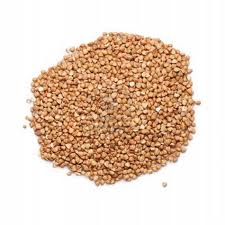 Buckwheat can refer to a number of species of plants. Common buckwheat was first domesticated in southeast Asia nearly 10,000 years ago. A truly ancient grain, buckwheat quickly spread around the known world, and was planted in the Balkans as early as 6,000 years ago. Buckwheat was one of the earliest crops introduced by Europeans to North America. A complete global dispersal was complete in 2006, when a variety developed in Canada was widely planted in China. Buckwheat has a rather short growing season and does well on lands which are acid in low in nutrients. In fact, soil which contains too much nitrogen can actually reduce yields of this ancient crop. Buckwheat is typically raised for grain when a short growing season is available, either because it is used as a second crop during the growing season, or because the climate is limiting. Today, the largest producer of buckwheat is Russia, followed by China and the United States.
Buckwheat can refer to a number of species of plants. Common buckwheat was first domesticated in southeast Asia nearly 10,000 years ago. A truly ancient grain, buckwheat quickly spread around the known world, and was planted in the Balkans as early as 6,000 years ago. Buckwheat was one of the earliest crops introduced by Europeans to North America. A complete global dispersal was complete in 2006, when a variety developed in Canada was widely planted in China. Buckwheat has a rather short growing season and does well on lands which are acid in low in nutrients. In fact, soil which contains too much nitrogen can actually reduce yields of this ancient crop. Buckwheat is typically raised for grain when a short growing season is available, either because it is used as a second crop during the growing season, or because the climate is limiting. Today, the largest producer of buckwheat is Russia, followed by China and the United States.
Key Nutrients
Buckwheat provides a healthy source of fiber and especially B vitamins. Buckwheat is also low in saturated and unsaturated fat content.
Health Benefits
Vitamin B1 – Thiamine is an important vitamin since it breaks down sugars in the body. Thiamine also helps to support nerve and heart health.
Vitamin B6 – Vitamin B6 helps to keep your immune system in good working order. It aids in the breakdown of fats, carbohydrates and amino acids while helping to maintain the health of lymph nodes. Additionally, vitamin B6 helps to regulate blood glucose levels.
Vitamin B9 – Folate is an important vitamin for liver function.
Vitamin B12 – Vitamin B12, or folic acid, helps to preserve neurological function and DNA synthesis. It also plays a key role in the health of red blood cells. The nervous system relies on vitamin B12 for proper function as well.
Dietary Fiber – Dietary Fiber stimulates digestion and peristalsis, helping to relieve indigestion and constipation problems.
Season
Since they store indefinitely, you can find buckwheat year round in your supermarket.
Nutrition Information
Per ¼ cup (42 grams):
Calories (cKal): 146
Protein (grams): 5.63
Total Fat (grams): 1.44
Carbohydrates (grams): 30.39
Fiber (grams): 4.2
Buying and Storing
There are no real issues to consider when buying buckwheat besides making sure you are comfortable with the source and brand. They store for a very long time, just make sure to keep in a sealed container, and store for up to one year.
Best Way to Add to Diet
Buckwheat make a great addition to a whole wheat bread, porridge recipe, soup or stew.
Buckwheat Recipe

 Not Sure What Healthy Foods To Eat?
Not Sure What Healthy Foods To Eat? This week we take a look at one of my favorite healthy foods...the mighty Avocado.
This week we take a look at one of my favorite healthy foods...the mighty Avocado.
No comments yet.